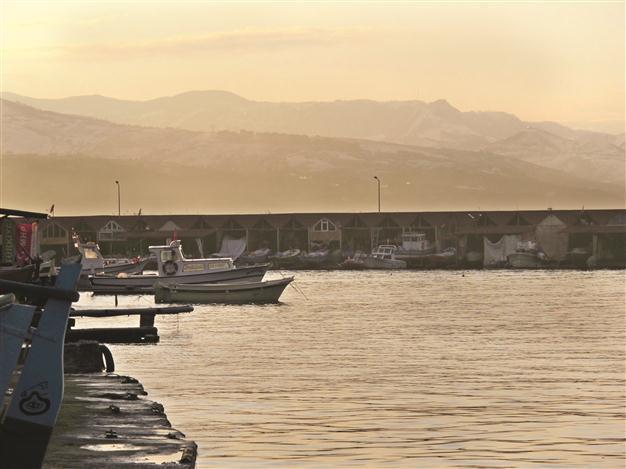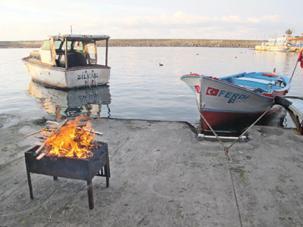Anchovy time in Trabzon
Wilco van Herpen Hürriyet Daily News

The newly constructed Black Sea coastal
road has changed the natural habitat. In the
past, fish could spawn on the shallow rocks,
but now that the road has been finished, the
sea bottom is now at least 30 meters deep. Photos by Wilco van Herpen
It is 5 a.m. and my alarm makes a screaming sound. It is time to get up. I hate getting up early but today I am going to catch some fish. I am going to be an anchovy (hamsi) fisherman. Actually, I’m late.
It is still dark as I leave my hotel and I run to the harbor where the fisherman has his boat. When I arrive, I just catch a glimpse of Ferdi, who is about to enter the open sea. I shout and shout and fortunately he hears me, turns around and returns to the shore.
The weather is nice, there is almost no wind and I do not see any waves. But what a miscalculation this turns out to be. I enter his boat and we set off. Immediately after leaving the harbor, the sea gets rough, very rough. I cannot imagine how my cameraman feels; sometimes when he is filming me he almost flies through the sky. The waves are high and rough. I steer the boat but every time I think I have the boat in the right direction, a wave suddenly approaches me from the side and I have to steer in order not to capsize.


I am in the
Black Sea province of Trabzon and it is anchovy time. Maybe you ate them, maybe you did not, but I advise you do so while it still is possible because, according to the people I spoke with, anchovies are about to become extinct.
Our boat trip does not last long. There is not one fisherman at sea at the moment as the sea is too rough. Ferdi is looking for a suitable place to throw one fishing net in the water but the water does not give him a chance and he decides to go back to the harbor. Once we sail around the barrier the water is calm and there is no storm and no waves.
We anchor his boat and go to the teahouse in the harbor. Ferdi is not a stranger there although he is not a full-time fisherman. Working for the Karadeniz Technical University Trabzon as a teacher, he does this job as a kind of hobby but still calls himself a fishermen as well.
We sit down, order tea and chat. We did not have any time for this when we were at sea due to the bad weather conditions so this is where it has to happen.
Bleak future of anchovies
“In the past, we would go out with little fishing boats and try to catch fish. My father knew just by looking at the clouds if the weather would be good or bad. Without any sonar or radar, he knew where the fish were, but nowadays all the big fishing boats have sonar and there is no escape possible for the fish. People are also catching fish in the wrong season. When the fish are spawning the fishermen still sometimes catch fish. This is wrong: we do not give the fish a change to survive. We should limit the time we are allowed to go out fishing, limit the amount of fish that we are allowed to catch and make the fish more expensive so professional fishermen can still maintain their work. They currently have to cover the costs of their employees as well as their big expensive ships; higher fish prices would help them a lot.
Nowadays our fishermen go as far as Georgia to catch fish, but what is going to happen if Georgia does not allow us to fish in their territory anymore? Do we have to go as far as Russia to catch fish?” Ferdi said.
While speaking with Ferdi, some of his friends joined us and all of them shared his opinion. There are still some fish – not as many as 15 or 20 years ago – but there is still time to solve the problem. But we have to act fast. Some of the fish have already disappeared and once anchovies disappear, the natural food chain will be broken and there will be no way back.
It perhaps does not sound very positive, but something has to be done because if we continue like this, soon there really will be no fish in the Black Sea anymore.
Wilco, travel, Turkey, tourism,



